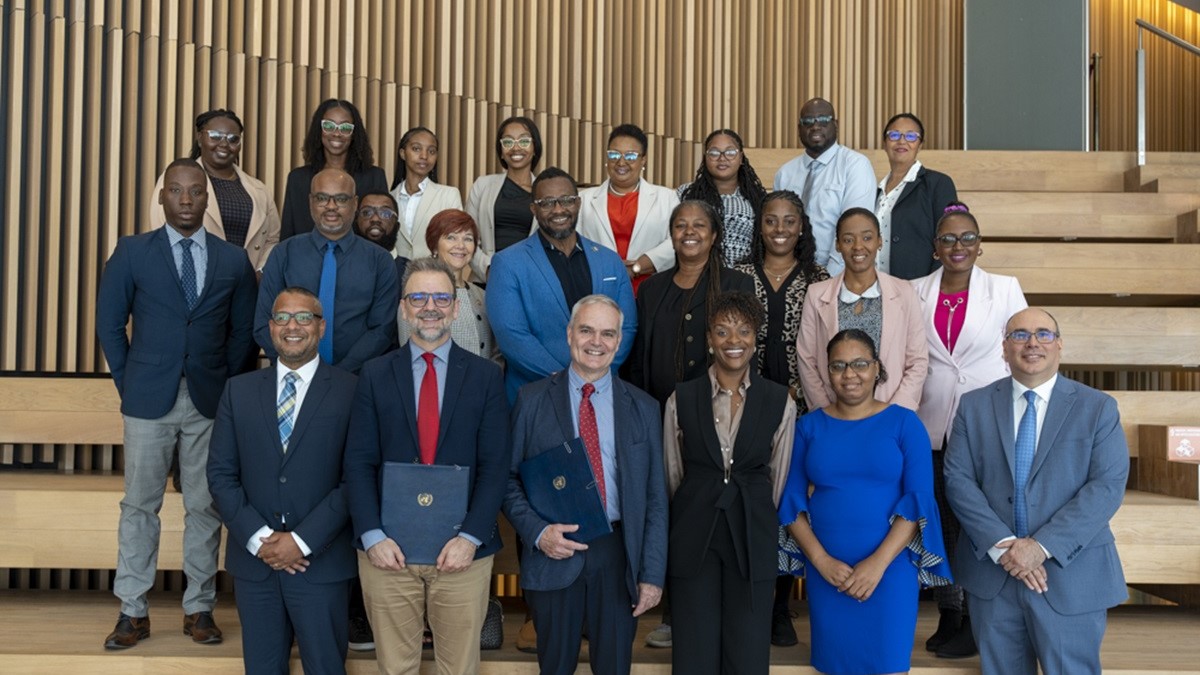The two organizations signed an agreement to bolster joint research related to trade, and better engage with students from the Caribbean region.
© UN Trade and Development (UNCTAD) | Deputy Secretary-General Pedro Manuel Moreno (first row, second left), Principal Clives Landis (first row, third left), and Barbados Ambassador Matthew Wilson (first row, first left) joined by master students of international trade policy from the University of the West Indies on 18 June at the Palais des Nations in Geneva.
The memorandum of understanding signed on 18 June builds on the decade-long cooperation between UN Trade and Development (UNCTAD) and the University of the West Indies (UWI) at Cave Hill, Barbados.
The agreement will reinforce joint research on trade-related topics particularly relevant to the Caribbean region, and boost capacity building through student study tours.
On behalf of UN Trade and Development, Deputy Secretary-General Pedro Manuel Moreno underscored the crucial role of, and collaboration with, academia.
“Research is one of our main pillars of work,” said Mr. Moreno, referencing the organization’s core strength in providing data and analysis, facilitating consensus building, and offering technical assistance to developing countries.
“Research is fundamental to inform policy dialogues and intergovernmental deliberations but also to feed our technical cooperation activities,” he added.
Clives Landis, principal of UWI Cave Hill Campus, praised the “thriving partnership” to foster trade policy as a catalyst for sustainable development.
Empowering future leaders of tomorrow
Since 2012, UN Trade and Development has been hosting UWI students through in-person and virtual study tours, equipping them with cutting-edge knowledge on the ever-evolving global economy, and exposure to multilateralism in action.
The yearly visit series has covered a range of topical issues high on the development agenda of the Caribbean region.
These include economic challenges facing small island developing states, the sustainable ocean economy, climate change, regional trade integration, and preferential agreements such as the European Union-CARIFORUM Economic Partnership Agreement.
Supporting multilateral trade negotiations
The two entities also joined forces to better integrate environmental sustainability in trade agreements and global negotiations.
Along with Yale University, they have been working together on the “Villars Framework”, to promote a sustainable global trade system, and enhance the participation of developing countries in the emerging sustainability-oriented economy.
In this regard, the partnership also seeks to strengthen joint research and consultations. This includes a study to map ocean-related economic measures of small island developing states, focusing on their national pledges under the Paris Agreement, known as Nationally Determined Contributions (NDCs).
Preliminary findings of the study have contributed to broader policy discussions at the first Global Supply Chain Forum held in Barbados, and the UN-led 4th International Conference on Small Island Developing States in Antigua and Barbuda.

